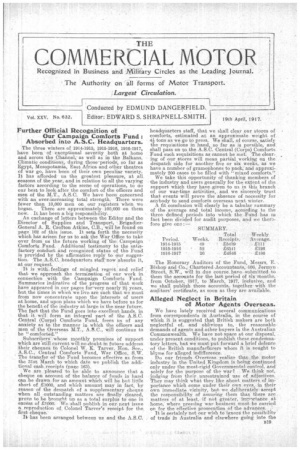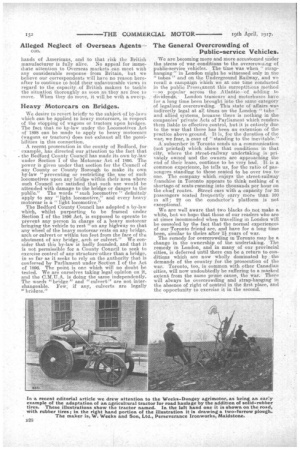Further Official Recognition of Our Campaign Comforts Fund : Absorbed into A.S.C.Headquarters.
Page 1

Page 2

If you've noticed an error in this article please click here to report it so we can fix it.
The three winters of 1914-1915, 1915-1916, 1916-1917, have been of exceptional severity both at home and across the Channel, as well as in the Balkans. Climatic conditions, during those'periods, so far as Egypt, Mesopotamia, East Africa and.other theatres of war go, have been of their own peculiar variety. It has afforded us the greatest pleasure, at all seasons of the year, and in relation to all the varying factors according to the scene of operations, to do our best to look after the comfort of the officers and Men of the M.T., A.S.C. We have been concerned with an ever-increasing total strength. There were fewer than 10,000 men on our registers 'when we began. There are approximately 100,000 on them now. It has been a big responsibility. , An exchange of letters between the Editor and tha Director of Supplies and Transport, BrigadierGeneral A. R. Crofton Atkins, C.B., will be found on page 162 of this issue. It isets forth the necessity which has arisen for us to ask the War Office to take over from us the future working of the Campaign Comforts Fund.Additional testimony to the satis
factory conduct a.nd recognized status of the Fund is provided by the -affirmative reply to our suggestion..The A.S.C. headquarters staff' now absorbs it,
at our request. .
It is with, feelings of mingled regret and relief that we approach the termination of our work in connection -with the Campaign Comforts Fund. Summarieg indicative of the progress of that work have appeared innur pages foryery nearly 2-12years, but. the times in which we live are such that we must from now concentrate upon the interests of users at home, and upon plans which we have before us for the benefit of the industry at large in the near future. The fact that the Fund goes into excellent hands, in that it will form an integral part of the A.S.C. Central (Corps) Comforts Fund, frees us of any anxiety as to the manner in which the officers and men of the Overseas MT., A.S.C., will continue to be "comforted."
• Subscribers whose monthly promises of support which are 'still current will no doubt in future address :their cheques to Colonel W. K. Ta,rver, Hon. Sec., A.S.C., Central Comforts Fund, War Office, S.W. The transfer of the Fund becomes effectiVe as from the 31st March to which date we publish the additional cash .receipts (page 163).
We are pleased to be able to announce that a cheque on account of the balance of funds in hand can ..be drawn for an amount which will be but little short of £1000, and which amount may in fact, by reason of the despatch of a supplementary cheque when all outstanding matters are ,finally cleared, prove to be brought up as a total surplus to one in excess of 21000. We shall publish in our next issue a. reproduction of Colonel Tarver's receipt for the. first cheque. It has been arranged -between us and the A.S.C.
headquarters staff, that we shall clear our stores of comforts, estimated at an approximate weight of
tons as we go to press. We shall, .of course, -satisfy the requisitions in hand, so far as is possible, and shall pass on to the A.S.C. Central (Corps) Comforts Fund such ifequisitions as cannot be met. The clearing of our stores will mean partial working on the despatch side for another five or six weeks, as we have a number of gramophones to pack,' and approximately 200 cases to be filled with "mixed comforts."
We take this opportunity of thanking members of the industry and users generally for the ex,tent of the support which they have given to us in this branch of our war-time activities, and we sincerely trust that events will prove the absence of necessity for anybody to send comforts overseas next winter.
A fit conclusion will clearly be a tabular summary of the average and total income, according to the three defined periods into which the Fend lia,s to fact been divided for audit purposes, and we therefore give one
The Honorary.'Auditors of the Fund, Messrs. E.. Bishop' mid Co.,Chartered Accoantantsa406, Yermyn Street, S.W., will in due course have submitted to them the accounts for the last period of Six 'months, from October, 1917, to March, '1917, inclusive, and we shall publish those accounts, togetherwith the auditors' certificate, as soon as they are aVailable.
Alleged Neglect in Britain of Motor Agents Overseas.
.have lately received several communications from correspondents in Australia, in the course of which it is suggested that British makers are both neglectful of, and oblivious to, the reasonable, demands of agents and other buyers in the Australian Commonwealth. We have not space at our disposal, under present conditions, to publish ihese eondemnatory letters, but we must put forward a brief defence of the British manufaclurers whom ft is sought to bIerne for alleged indifference. Do our friends Overseas realize that, ,the motor industry in the United Kingdom is being continued only under the most-rigid Governmental, control, and solely for the purpose of the war ? We think not, judging from their unrestrained use of adjectives. They may think what they like about matters of importance which come under their own eyes, in their own immediate vicinity, but we deliberately accept the responsibilily of assuring, them that there are matters of at least. if not greater, importance at home, where pressing war business must be carried on for the effective prosecution of the .advances.
It is certainly not our wish to ignore the possibility of trade in Australia and elsewhere going into the 1319 hands of Americans, and to that risk the British manufacturer is fully alive. No appeal for immediate attention to Overseas markets can meet with any considerable response from Britain, but we believe our correspondents will have no reason hereafter to continue to hold their unfavourable views in regard. to the capacity of British makers to tackle the situation thoroughly as soon as they are free to move. When they do move, it will be with a sweep.
Heavy •Motorcars on Bridges.
We desire to revert briefly to the subject of by-laws which can be applied to heavy motorcars, in respect of the stopping of wagons or tractors upon bridges. The fact that no by-law under the Locomotives Act of -1898 can be made to apply to heavy motorcars (wagons or tractors) does not exhaust all the possibilities in this connection.
A recent prosecution in the county of Bedford, for example, has directed our attention tothe fact that the Bedford County Council has made its own by-law under Section I of the Motorcar Act of 1896. The power is given under that section for the Council of any County or County Borough to make its own by-law "preventing or restricting the use of such locomotives upon any bridge within their area where such Council are satisfied that such use would be attended with damage to the bridge or danger to the public." The words "such locomotive " definitely apply to any "light locomotive," and every heavy motorcar "light locomotive." The Bedford County Council has adopted a by-law which, whilst; purporting to be framed under .
Section I of the 1896 Act, is supposed to operate to prevent any person in charge of a heavy motorcar bringing the vehicle to rest on any highway so that any wheel of the heavy motorcar rests on any bridge, arch or culvert or within ten feet from the face of theabutment of any bridge, arch or culvert." We 'consider that this by-law is badly founded, and that it is not permissible for a County Council to seek to exercise control a any structure•other than a bridge, in so far as it seeks to rely on the authority that is conferred by Parliament under Section I of the Act of 1896. The point is one which will no doubt be tested. We are ourselves taking legal opinion on it, and the C.M.U.A. is doing the same independently. The Words "bridge" and "culvert" are not interchangeable. Few, if any, culverts are legally "bridges."
The General Overcrowding of Public-service Vehicles.
We are becoming more and more accustomed under the stress of war conditions to the overcrowding of public-service vehicles. The time was when " straphanging" in 'London might be witnessed only in the " tubes " and on the Underground Railway, and we recall a campaign which we at one time conducted in the public Pressianent this surreptitious method
popular across the Atlantic—el adding to dividends. • London tramcars and motorbuses have for a long time been brought into the same category of legalized overcrowding. This state of affairs was indirectly legal at all tiines on the London-" tube" and allied systems, because there is nothing in the companies' private Acta cif Parliament which renders them liable to effective control, but it is entirely due to the war that there has been an extension of the practice above ground. It is, for the duration of the war, we fear, a case of "standing to the inevitable."
A subscriber in Toronto sends us a communication (not printed) which shows that conditions in that city, where -the street-railway undertaking is privately owned and the owners are approaching the end of ,their lease, continue to be very bad. It is a common experience, he tells us, for the ratio or pas
. seugers standing to those seated to be over two to one. The company which enjoys the street-railway franchise in Toronto appears to think nothing of a shortage. of seats running into thousands per hour on the chief routes. Street cars with a capacity for 36 passengers seated frequently carry more than 100 In all ; 22 on the conductor's platform is not exCeptional.
We are well aware that two blacks do not make a white, but we hope that those of our readers who are at times incommoded when travelling in London will be consoled by the fact that the normal experiences of our Toronto friend are, and have for a long time been, similar to theirs after '% years of war.
The remedy for overcrowding in Toronto may be a change in the ownership of the undertaking. The remedy in London, and in many of our provincial cities, is deferred until there can be a return to conditions which are now wholly dominated by the demands of the country for the prosecution of the war. Toronto, too, in common with other Canadian cities, will now undoubtedly be suffering to a marked extent from the same prime cause, the war. There will always be overcrowding and strap-hanging in the absence of right of control in the first place, and the opportunity to exercise it in the second.






















